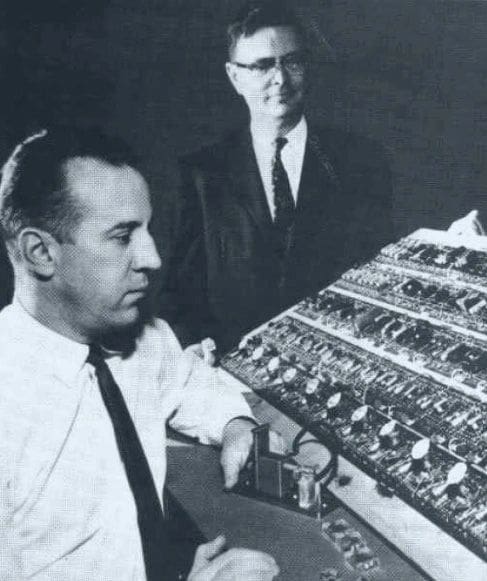
Max Hetzel, inventor of the Accutron
Max Hetzel, inventor of the Accutron
Text borrowed from the Wayback Machine.
Max grew up in a happy family where curiosity in science was encouraged. His father taught him how to build things and together they often explored the natural world in the forests and hills around Muttenz in Switzerland. It was his father who later insisted that he attend the Mathematical and Natural Science College, as Max himself did not particularly like school and wanted to become a radio technician.
During his youth, there was often not enough money available to buy the things he longed for, so he went to the dumps of his home town and looked for items he could use, as he loved to tinker with mechanical objects.
One day when he was about 10 years old, he found an old dynamo. He mended this treasure and fixed it to his old bicycle. As he did not own a lamp he used an old tin with a little bulb attached on the inside. At nightfall pedalled very fast and, leaning over the handlebars, he was able to see a faint light. This experience had a very strong impact on Max and from this moment on he knew he wanted to become an engineer.
Now he needed a steady supply of electrical components. A friend of his whose father owned an electrical supply store let him go through the storage rooms filled with old junk. Every time Max found a treasure he wanted he had to pay his friend with a tadpole, frog or the like as he did not have any pocket money.
Max always wanted to know how things worked. As a boy his curiosity in science often got him into trouble. When he was eleven he received an old pocket watch from a relative and while at Sunday School the following day his curiosity got the better of him. Also, he found Sunday School rather boring. He just had to have a look inside the watch to find out how this wonderful thing worked. So he opened the back of the watch with his Swiss army knife and looked at the movement with amazement. Of course the Sunday School teacher caught him and punished him severely for not paying attention to the lesson!
After that he built a variety of radios and a simple telephone. To be able to speak to someone he had to give his younger brother a treat so that he would agree to talk to him on the phone for a few minutes.
After primary school he went to the Mathematical and Natural Science College in Basel. His primary school teacher in Muttenz told him he did not think he would succeed in this elite school and that he had better buy a return ticket home. Max was hurt by this remark, but he was also determined to succeed. He did not want to disappoint his father who believed in him.
Often his science hobbies were so tempting that he forgot to concentrate on school. When he was in high school he was very interested in astronomy. Lacking the funds to buy a telescope, he decided to grind his own powerful lens and build a telescope. This labor of love cost him over 720 hours of painstaking grinding. The result was that he almost had to repeat a year in school because he fell behind with his studies. Nevertheless, his telescope was a great success and he finished high school with the best results in his class.
After serving in the army he was able to enrol at the ETH, the Federal Institute of Technology in Zurich. He loved mathematics and physics and worked hard to earn his masters degree in Electronics. His degree thesis “Electromechanical frequency filters for telegraphy channel transmission” received the University’s Silver Medal Award for outstanding achievement. This paper contained the mathematical basis for the calculation of tuning fork watches. But at this stage Max Hetzel did not recognize this important fact. Nevertheless, his thesis later influenced him when he was looking to reinvent watchmaking.
After university Max first worked for Hasler in Berne where he invented radio-television devices using tuning forks. When he asked to receive royalties for his invention Hasler refused. But Max and his family could not live on the modest salary he received and so it was time to look for a new employer. Bulova Watch Company in Biel advertised that they were looking for a talented engineer and that they were offering an interesting and well-paid job.
Although Max knew very little about watches, he was interested in the job and so he and his family moved to Biel, where he later invented the first electronic tuning fork watch.
If Max had not invented the Accutron he would have made some other great discovery. He has over 100 patents to his name and not just in the watchmaking field. Once he left the watchmaking industry in his late fifties he invented and patented a computerized tapping machine. Why a tapping machine? Because he used to get frustrated with the conventional tapping machines during his watchmaking years! In the early eighties he taught himself computer science and built and programmed his own computer in order to produce this precision tapping machine.
Tags: